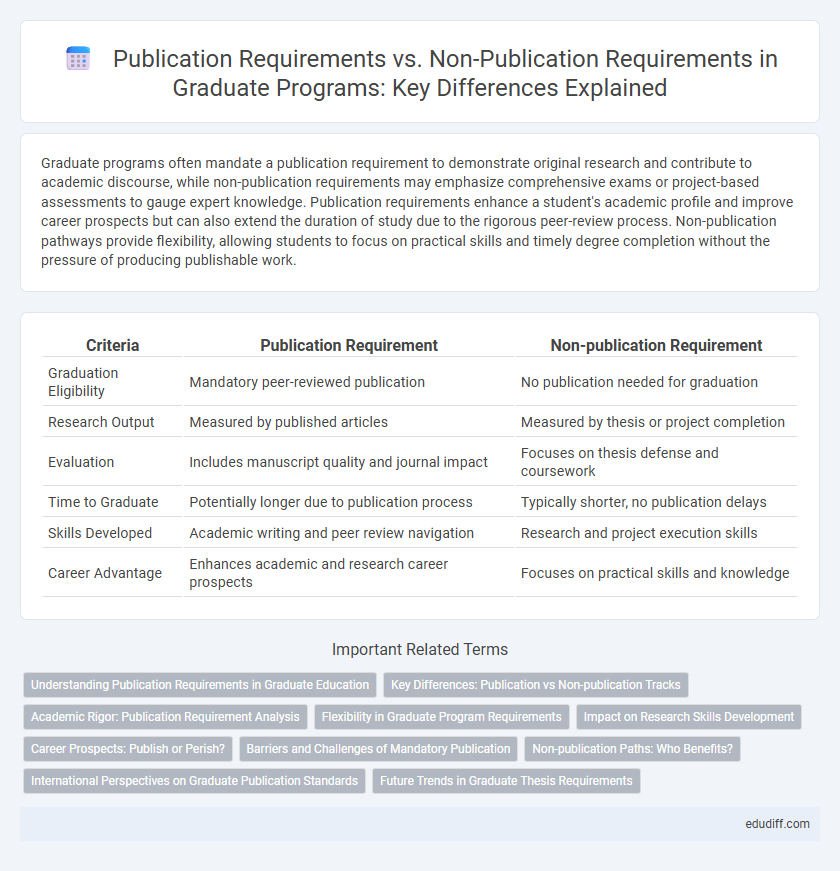Graduate programs often mandate a publication requirement to demonstrate original research and contribute to academic discourse, while non-publication requirements may emphasize comprehensive exams or project-based assessments to gauge expert knowledge. Publication requirements enhance a student's academic profile and improve career prospects but can also extend the duration of study due to the rigorous peer-review process. Non-publication pathways provide flexibility, allowing students to focus on practical skills and timely degree completion without the pressure of producing publishable work.
Table of Comparison
| Criteria | Publication Requirement | Non-publication Requirement |
|---|---|---|
| Graduation Eligibility | Mandatory peer-reviewed publication | No publication needed for graduation |
| Research Output | Measured by published articles | Measured by thesis or project completion |
| Evaluation | Includes manuscript quality and journal impact | Focuses on thesis defense and coursework |
| Time to Graduate | Potentially longer due to publication process | Typically shorter, no publication delays |
| Skills Developed | Academic writing and peer review navigation | Research and project execution skills |
| Career Advantage | Enhances academic and research career prospects | Focuses on practical skills and knowledge |
Understanding Publication Requirements in Graduate Education
Graduate education often mandates meeting publication requirements to demonstrate original research contributions and enhance academic credibility. Understanding these requirements involves recognizing the number, type, and quality of publications needed, which vary by discipline and institution. Non-publication requirements might include comprehensive exams or thesis submission, but publications significantly impact career advancement and scholarly engagement.
Key Differences: Publication vs Non-publication Tracks
Graduate programs with publication requirements mandate students to produce peer-reviewed articles as part of their degree, enhancing research visibility and academic credibility. Non-publication tracks emphasize alternative outputs such as comprehensive theses, project reports, or portfolios, focusing on demonstrating mastery and application without the necessity of external publication. Key differences lie in the emphasis on scholarly dissemination and formal peer validation for publication tracks versus comprehensive academic fulfillment and practical expertise for non-publication tracks.
Academic Rigor: Publication Requirement Analysis
Publication requirements in graduate programs significantly enhance academic rigor by mandating peer-reviewed dissemination of research findings, which ensures validation and scrutiny by the scholarly community. This process fosters critical thinking, methodological precision, and advances knowledge through documented contributions, contrasting with non-publication requirements that may emphasize coursework or thesis submission without external evaluation. The demand for publication promotes a higher standard of originality and accountability, preparing graduates for academic and professional excellence.
Flexibility in Graduate Program Requirements
Graduate programs with publication requirements often demand students to disseminate original research in peer-reviewed journals, ensuring scholarly contribution and academic rigor. Non-publication requirements provide alternative options such as comprehensive exams, projects, or portfolios, offering students flexibility to demonstrate expertise without mandatory publishing. This adaptability allows programs to accommodate diverse academic goals, research interests, and career paths within graduate education frameworks.
Impact on Research Skills Development
Publication requirements significantly enhance research skills development by encouraging rigorous data analysis, critical thinking, and effective scientific communication. Graduate students engaged in publication often demonstrate improved proficiency in literature review, hypothesis formulation, and methodological design. In contrast, non-publication requirements may limit opportunities for practical skill application and reduce exposure to peer review processes that are essential for scholarly growth.
Career Prospects: Publish or Perish?
Graduates facing publication requirements often experience enhanced career prospects due to increased visibility and credibility in their academic fields, as published work provides tangible evidence of expertise and research competence. In contrast, non-publication paths may limit opportunities for tenure-track positions and competitive grants, where peer-reviewed publications serve as key evaluation metrics. The "publish or perish" paradigm underscores the critical role of scholarly publishing in securing academic advancement and professional recognition.
Barriers and Challenges of Mandatory Publication
Mandatory publication requirements for graduate students often create significant barriers, including limited access to high-quality journals and the pressure to meet strict submission deadlines. These challenges can lead to increased stress, hinder academic progression, and reduce the focus on research quality in favor of quantity. Non-publication pathways, by contrast, alleviate these obstacles, allowing a more flexible approach to degree completion without compromising scholarly development.
Non-publication Paths: Who Benefits?
Non-publication paths in graduate programs benefit students prioritizing practical skills, entrepreneurial ventures, or those entering industry roles where published research is less critical. These alternatives accommodate professionals seeking advanced knowledge without the pressure of formal academic publishing. Institutions offering non-publication options attract diverse candidates aiming to enhance expertise while maintaining career flexibility.
International Perspectives on Graduate Publication Standards
Graduate publication requirements vary significantly across international academic institutions, with many universities emphasizing peer-reviewed journal articles to demonstrate research competency and contribute to global scholarship. Non-publication requirements may include thesis defense, comprehensive exams, or practicums that focus on practical skills and theoretical understanding without mandating published work. Countries like the United States and Canada often prioritize publication for doctoral candidates, while European and Asian institutions may adopt more flexible approaches, balancing publication with alternative assessments to accommodate diverse academic cultures.
Future Trends in Graduate Thesis Requirements
Future trends in graduate thesis requirements increasingly emphasize open-access publication to enhance research visibility and impact. Institutions are integrating digital repositories and mandating DOI assignment for theses to ensure permanent accessibility. Non-publication alternatives focus on data privacy and intellectual property protection, catering to sensitive or proprietary research domains.
Publication Requirement vs Non-publication Requirement Infographic

 edudiff.com
edudiff.com